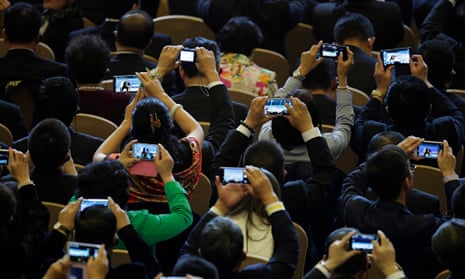Nothing exists nowadays unless it is Facebooked, Tweeted or Instagrammed with emphasis on “insta”. So perhaps the event that I hosted on Tuesday at the Royal Institution, TEDGlobal London, didn’t exist. Because we ran a little experiment, banning the use of smartphones, tablets, laptops, cameras – any electronic device – during the conference.
At the end of the event (which over two sessions of 100 minutes each featured scientists, technologists, historians, a photographer, a slam poet, a singer, a racing car driver and a writer) I asked the 350 attendees whether we should apply the same rule next time. It’s a safe guess that at least two-thirds of them use Twitter or FB with some regularity, but pretty much every hand in the theatre shot up, with maybe two exceptions. I have heard nothing but positive feedback since.
Using technology – that’s the “T” in the name – is organic to all we do at TED. We have a massive online presence; with a multiplicity of channels from TED.com to YouTube to Chinese portals to Netflix. We run many social media accounts, with followers in the millions. TED attendees are generally very active on social media. Over the years, however, the rising ubiquity of phones and tablets at the events has become a real problem. We have invited people to refrain from using them during sessions, unsuccessfully. We have tried to enforce an “only in the last two rows” rule. Same result.
Screens are irresistibly distracting for the person using them, because once you turn to your screen, clever interfaces are designed to keep you there, on to that ping, on to that status update. The problem is that they also seriously interfere with the ability to focus of nearby peers (a concept coined by three Canadian researchers who studied this). Letting someone turn on a screen in an audience is akin to giving them permission to degrade, at their sole discretion, the experience of everyone else.
Hence on Tuesday we decided to experiment with a flat-out ban. We had alerted people when we invited them and the day before the event, I emailed a reminder, suggesting they “bring pen and paper if you want to take notes”.
Most did and no one pulled out a device. The U-shaped theatre, with the audience facing each other, probably created a bit of self-policing . But it did feel as if we had let fresh air into the room and it shifted perceptibly the quality of the attention paid to the speakers.
There were many tweetable quotes in the talks, so we certainly willingly forfeited some visibility on social media. It was, in its small way, a countercultural experiment, an attempt to row against the constant networked noise for a few hours and see whether we could offer undivided attention to a dozen amazing people who stood up and told stories and shared ideas of significance.
I have a hunch, from post-event conversations, that many felt a sense of relief that they didn’t have to competitively “update” their social feeds and walls. The ban “gave permission” to listen focusedly with the real others in the room, rather than having to share and exhibit their presence to virtual others online.
All those hands went up at the end, so we’re going to implement the ban again. I would be more than thrilled if other conferences started doing the same. It’s time we claim back spaces for attention, that we regain a capacity to be present, to engage with the meaning of a story and stop scanning only for its tweetable bits. After the conference, a participant told me: “This is the longest daytime block of time I have spent detached from an electronic device in ages, a licence to concentrate!” She was smiling.
Bruno Giussani is European director of TED
